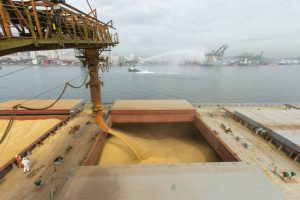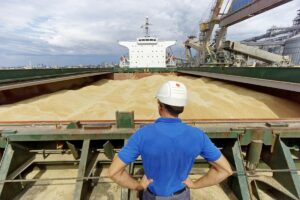How to counteract populists and solve the problem of border blockades
Blockades on the Polish-Ukrainian borders in 2023 set a precedent when a protest against Ukrainian economic influence becomes a tool for Polish business to pressure its government. In the future, such actions may spread to other EU countries – if the Ukrainian government or business does not introduce measurable, transparent and demonstrable export cargo logistics.
The events of 2023 on the Polish-Ukrainian border opened a “Pandora’s box”: various strata of Polish business saw the trade blockade of Ukraine as a method of solving their problems. This is how the first farmers’ protests of this year turned into “give us subsidies of 1,000 zlotys per hectare of corn”, “don’t raise our agricultural tax”, etc.
At the same time, Poland’s deputy minister of agriculture, Michal Kolodzejczak, continued to claim that Ukrainian agricultural products are allegedly capable of destabilizing food production in every EU country. This is, first of all, a signal for the rest of the 26 EU countries: “Get ready, you will have controversial issues with Ukraine because of its agricultural exports.” And also a signal for the businesses of these countries: “If you want to negotiate preferences or subsidies, announce that you are suffering from Ukrainian agricultural products, organize a protest or block the road. And you will be happy.”
Since business associations in Europe are very powerful, and their opinion weighs more than the opinion of the government, this cycle (blocking of Ukrainian agricultural products in exchange for preferences) can continue indefinitely. And there is no guarantee that this topic will not be adopted by local populists and all kinds of destructive movements.
A proactive position of the Ukrainian government or business, as well as pro-Ukrainian EU politicians and entrepreneurs, can prevent this. In particular, it is about the introduction of modern technologies for the administration and tracking of export-import flows between Ukraine and EU countries. Current logistics cannot solve this problem, but technologies are now available that can very quickly improve processes and save our European future.
Analysis and exchange of data in real time, solving logistics problems with the help of mathematical models or artificial intelligence will help manage the tension of logistics infrastructures. This will significantly improve their operational interaction with cargo owners in Ukraine and end consumers in the EU. And vice versa.
Economic shocks and “threats of market destabilization” lead countries’ economies to overspending. After all, shocks are usually extinguished with money (subsidies, subsidies, preferences), or by refusing to do so and, in the end, stopping development. Now imagine European politicians and businesses receiving a digital calculation and action plan. And they will see in advance: where and on whom Ukrainian products will influence; which elevator and port capacities will be occupied; how much businesses will lose and how much they will earn; where and whose markets will Ukrainian agricultural products go to; how consumer prices will react, etc.
Transparent, responsible and evidence-based logistics is the tool that will remove the levers of pressure from populists. Imagine that all data is available and open. We would knock all the arguments of those who block or strike from under their feet. Of course, those politicians who use riots for their own purposes, for ratings, would not be happy about this. But I am sure that the sane, pragmatic forces opposed to populism would be interested in having open, honest logistical data and a mathematically calculated impact analysis.
The initiative of Ukrainian and Polish businesses in the segment of agriculture, logistics and IT can be cited as an example of the possibility of building evidence-based logistics principles. In December, entrepreneurs announced the creation of a unified and transparent logistics and information environment. According to the signatories, this will provide its participants with equal access to data on infrastructure, export plans, movement and location of transport.
A computer with a mathematical model will not come to manage logistics processes by itself. It will happen only when people, the responsible part of them, want it. Such people can be directly business owners who do not want to uselessly overpay and lose money for transportation. It can also be the governments of countries that do not want to indulge populists, but are interested in having a modern tool for forecasting economic processes, anticipating possible shocks and mitigating them in time.
Under such conditions, European processors and consumers of Ukrainian products could carefully plan to increase their production capacities. And the market would understand such plans in advance. Such an approach would allow us to prevent misunderstandings and integrate the Ukrainian agricultural sector into the EU without the risk of destabilizing markets, with an early predicted impact on the economies of European countries.





